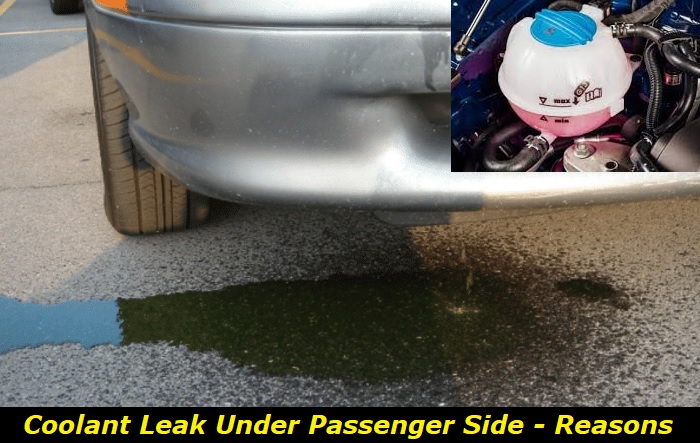Discovering a puddle under your car's passenger side can ruin your day. You instantly know it's antifreeze and your heart sinks. Antifreeze leakage can be an alarming situation for any car owner. It's not only hazardous for the environment, but it can also lead to engine damage, overheating, and other issues.
Coolant leaks highlights
- Level of urgency:very high
- Commonreasons:cooling equipment failure, pipe connections, radiator damage
- DIY diagnostics:possible but complicated
- DIY repair:mostly impossible
- Price of repair:$350 - $1,500
- Time for repair:3 - 8 hours
- If ignored:overheating, equipment failure

Understanding the Cooling System and Antifreeze
Antifreeze is a specialized liquid that's added to a car's cooling system. Its primary function is to help regulate the engine's temperature by absorbing and dispersing heat. It also serves as a lubricant for the engine's water pump, helping it to function smoothly.
Most antifreeze is made from a combination of ethylene glycol and water, with other chemicals and additives mixed in. The resulting liquid has a lower freezing point than pure water, which is why it's called antifreeze. It also has a higher boiling point, which means it can keep the engine from overheating even under extreme conditions.
The cooling system is a complex network of parts that work together to maintain the engine's temperature. It starts with the engine itself, which produces a lot of heat as it runs.
This system also includes other parts, such as the thermostat, which helps regulate the temperature of the engine, and the fan, which helps move air over the radiator to cool the coolant.
Antifreeze plays a critical role in maintaining the health of your engine. Without it, the coolant would freeze in cold weather, which could cause the engine to crack. In warm weather, the coolant could boil and evaporate, which would leave the engine without any cooling at all. Antifreeze also helps prevent corrosion in the cooling system by inhibiting the buildup of rust and scale.
Signs you have an Antifreeze Leak
Unfortunately, it's not uncommon for antifreeze leaks to occur, and if left unaddressed, they can cause serious damage to your engine. That's why it's important to be able to recognize the signs of an antifreeze leak before it becomes a major problem.
We'll explore some of the most common signs of an antifreeze leak and what you can do to address the issue.
1) Low coolant levels
One of the most obvious signs of an antifreeze leak is low coolant levels. If you notice that your coolant level is lower than it should be, it's a good indication that you have a leak somewhere in the cooling system. You may also notice that your car is running hotter than usual, which is a sign that the engine is not getting enough coolant.
2) Sweet smell
Antifreeze has a sweet smell, so if you notice an unusual sweet smell inside or outside of your car, it could be a sign of a leak. You may also notice a sweet smell in the exhaust, which could indicate that the antifreeze is being burned off in the engine.
3) White smoke from the exhaust
White smoke coming from the exhaust can also be a sign of an antifreeze leak. This is caused by antifreeze mixing with the fuel and being burned off in the engine.
4) Puddles under the car
If you notice puddles of fluid under your car, it could be a sign of an antifreeze leak. The fluid will typically be green or pink in color. Not all leaks will create puddles, so you need to look out for other signs as well.
5) Overheating engine
An overheating engine is a clear sign that something is wrong with the cooling system. If you notice that your engine is running hotter than usual, it could be a sign of an antifreeze leak. This is because the engine is not getting enough coolant to regulate the temperature.
How to Locate an Antifreeze Leak?
If you suspect an antifreeze leak, try to locate it as quickly as possible so you can get it fixed. Here are some of the best ways to locate an antifreeze leak in your car.
- Look for puddles
The easiest way to locate an antifreeze leak is to look for puddles under your car. Remember, antifreeze is typically green or pink in color and has a sweet smell. If you see a puddle under your car that matches this description, it's likely that you have an antifreeze leak.
- Check the radiator and hoses
Check the radiator for any signs of corrosion or damage, such as cracks or leaks around the seams. Also, inspect the hoses and make sure that the clamps are tight and secure.
- Inspect the water pump
Inspect the water pump for any signs of damage, such as cracks or leaks around the gasket or seals.
- Check the heater core
Here, you're also checking for leaks or corrosion. You may also notice a sweet smell in the cabin of your car, which could be a sign of a heater core leak.
- Use a cooling system pressure tester
If you're having trouble locating an antifreeze leak, you can use a cooling system pressure tester to help identify the problem. This tool pressurizes the cooling system and can help you locate any leaks that may be difficult to see with the naked eye.
- Use a UV dye
Add the dye to the coolant, and then use a UV light to locate the leak. The dye will glow under the UV light, making it easier to pinpoint the source of the leak.
Fixing Antifreeze Leak
If you've located an antifreeze leak, it's important to have it repaired as soon as possible to prevent further damage to your engine.
Some of the most effective methods for fixing an antifreeze leak include:
1) Replace the damaged parts
If you've located the source of the leak, you'll need to replace the damaged parts. This may include the radiator, hoses, water pump, or other components of the cooling system. If you're not comfortable performing these repairs yourself, it's best to have a professional mechanic take care of it for you.
2) Repair small cracks
If the source of the leak is a small crack in the radiator or a hose, you may be able to repair it with a sealant. There are several types of sealants available, including liquid sealants and sealant tapes. Follow the manufacturer's instructions carefully, and be sure to let the sealant cure completely before driving your car.
3) Tighten loose clamps
If the source of the leak is a loose clamp, you can tighten it to stop the leak. Use a pair of pliers or a wrench to tighten the clamp until it is snug. Be careful not to over-tighten the clamp, as this can cause damage to the hose.
4) Check for other issues
In some cases, an antifreeze leak may be a symptom of a larger problem with the engine. For example, a blown head gasket can cause coolant to leak into the engine, leading to serious damage.
Preventing Antifreeze Leak
Antifreeze leaks can cause serious damage to your car's engine, but there are several steps you can take to prevent them from occurring.
Here are some tips to help you prevent antifreeze leaks:
- Check your coolant levels regularly: Low coolant levels can cause your engine to overheat, which can lead to a coolant leak. Make sure to top off your coolant levels as needed, and keep an eye out for any sudden drops in the level.
- Have your car's cooling system inspected: A professional mechanic can inspect your cooling system for any signs of wear and tear, such as cracks in the hoses or corrosion in the radiator. By catching these issues early, you can prevent them from turning into a major antifreeze leak.
- Replace your coolant as recommended by your car's manufacturer: Over time, the coolant in your engine can become contaminated or break down, which can cause damage to your cooling system.
- Use the correct type of coolant for your car. There are different types of coolant available, and using the wrong type can cause damage to your engine. Check your car's owner's manual to find out which type of coolant is recommended, and make sure to use the correct type.
- Don't ignore warning signs: If you notice that your engine is overheating, or smell a sweet odor coming from your engine, it could be a sign of an antifreeze leak. Don't ignore these warning signs, and take your car to a mechanic as soon as possible.
Conclusion
Discovering antifreeze leaking under your car's passenger side can be alarming, but it is essential to take swift action to locate and fix the issue to avoid further damage.
With the information you now have, you should be equipped with the knowledge and tools needed to find the source of the leak and repair it efficiently. Remember to prioritize safety, regularly check your vehicle's fluids, and address any issues promptly to ensure a safe and smooth ride on the road.
About the authors
The CarAraC research team is composed of seasoned auto mechanics and automotive industry professionals, including individuals with advanced degrees and certifications in their field. Our team members boast prestigious credentials, reflecting their extensive knowledge and skills. These qualifications include: IMI: Institute of the Motor Industry, ASE-Certified Master Automobile Technicians; Coventry University, Graduate of MA in Automotive Journalism; Politecnico di Torino, Italy, MS Automotive Engineering; Ss. Cyril and Methodius University in Skopje, Mechanical University in Skopje; TOC Automotive College; DHA Suffa University, Department of Mechanical Engineering






Add comment